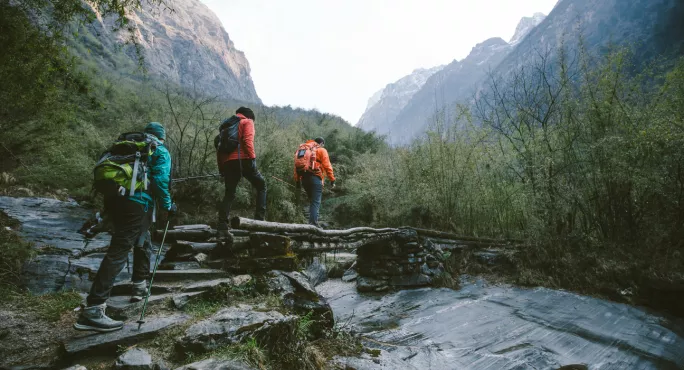
- Home
- Teaching & Learning
- Secondary
- Why geography teachers need to fight for field trips
Why geography teachers need to fight for field trips

In the past few weeks, it has been truly heartening to see geography teachers take up the fieldwork baton and share news of their pupils’ “return to the field”.
From investigating infiltration rates to local coastline and urban change, or students emptying their wellies after a river survey, it’s clear that the love of getting out for trips has been undimmed by the pandemic.
But the rebirth of fieldwork could now be undermined by Ofqual’s new consultation that proposes to lift the mandatory requirement for fieldwork days for the summer 2022 exams - sending a signal that fieldwork will be, at best, optional and, at worst, surplus to schools’ requirements.
Furthermore, it means geography teachers, on top of the workload avalanche of grading GCSE and A-level students, now have to find the time to read and respond to this consultation, which opened just a week ago and will end on Friday 28 May.
GCSEs and A levels 2022: Geography field trips under threat
Despite this, we at the Royal Geographical Society (with IBG) urge geography teachers to demonstrate their support for fieldwork in their responses to the consultation.
Ofqual’s plans for fieldwork serve to undermine the sterling work of teachers, who have already been undertaking fieldwork since government guidelines allowed schools to undertake day visits from 12 April and UK-based residential fieldwork from 17 May.
Although, with the emergence of a new variant of Covid, we all remain cautious as to whether all restrictions will be lifted on 21 June, the hope is they will, allowing fields trips to become an integral part of geography lessons once again.
But rather than encouraging and supporting geography teachers’ commitment to fieldwork, Ofqual’s proposals would both turn the dial back to the start of the pandemic and also enforce these negative changes through until summer 2022.
The great outdoors
This also seems a damaging move when we consider all the benefits that field trips have - these are the reasons why we actively supported the requirement in GCSE and A-level specifications from 2016, a move that has made it far easier for geography teachers in securing the support for their fieldwork from their leadership teams.
Furthermore, the benefits of fieldwork to young people’s achievements reach beyond their ability to accurately answer a GCSE question or successfully undertake an A-level independent investigation.
At the heart of fieldwork is the hands-on development of young people’s abilities to “do geography” and to “think geographically” about their world.
Such benefits are well-established, and in its recent blog about primary geography, Ofsted highlighted how vital fieldwork is to geographical practice, starting from the early years onwards.
Unique opportunities
Fieldwork can also sometimes be the first time that many students, particularly those from black, Asian and/or minority ethnic or low-income backgrounds, visit the natural environment.
Indeed, in 2019 the government-commissioned Landscapes Review identified a disconnection between black, Asian and other minority ethnic children and the natural landscape, and also that 18 per cent of children living in the most deprived areas never visited the natural environment at all.
So, while Department for Education guidance points towards going beyond the classroom and into the field, Ofqual proposals may serve to restrict fieldwork over the next academic year.
There could be negative longer-term implications, too. If these proposals are carried through in full, a student looking to move on to a geography degree in autumn 2022 would have had the fieldwork elements of their GCSE and A level disapplied in Year 11, Year 12 and Year 13.
Long-term harms
This is causing significant concern amongst higher-education geographers facing the recruitment of future undergraduates, whose experience of fieldwork would have been curtailed throughout the final three years of their school geography.
These HE colleagues will also be responding to the consultation and Jenny Pickerill, professor of environmental geography at the University of Sheffield, has expressed her concern. saying: “Fieldwork is integral to a high-quality geography education, and to have students arrive at university without these basic skills is worrying and ultimately harms their employability.”
Given all this, the Royal Geographical Society (with IBG) strongly disagrees with Ofqual’s proposals and will be making this view clear in the consultation.
We hope geography teachers will once again demonstrate their commitment to their subject and find the time to outline their support for fieldwork so this vital part of the curriculum remains in place for the year ahead and beyond.
Steve Brace is head of education and outdoor learning at the Royal Geographical Society (with IBG). You can follow him on Twitter at @SteveBraceGeog
You need a Tes subscription to read this article
Subscribe now to read this article and get other subscriber-only content:
- Unlimited access to all Tes magazine content
- Exclusive subscriber-only stories
- Award-winning email newsletters
- Unlimited access to all Tes magazine content
- Exclusive subscriber-only stories
- Award-winning email newsletters
You need a subscription to read this article
Subscribe now to read this article and get other subscriber-only content, including:
- Unlimited access to all Tes magazine content
- Exclusive subscriber-only stories
- Award-winning email newsletters
- Unlimited access to all Tes magazine content
- Exclusive subscriber-only stories
- Award-winning email newsletters
topics in this article



